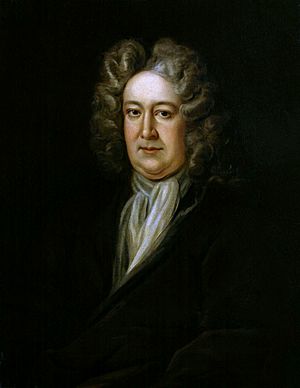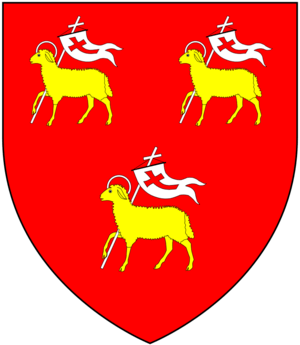Nicholas Rowe (writer) facts for kids
Quick facts for kids
Nicholas Rowe
|
|
|---|---|

Portrait of Nicholas Rowe
|
|
| Poet Laureate of the United Kingdom | |
| In office 1 August 1715 – 6 December 1718 |
|
| Monarch | George I |
| Preceded by | Nahum Tate |
| Succeeded by | Laurence Eusden |
| Personal details | |
| Born | 20 June 1674 Little Barford, Bedfordshire, England |
| Died | 6 December 1718 (aged 44) |
| Resting place | Westminster Abbey |
| Spouses | Anne, née Devenish |
| Children | John Rowe (from first wife), Charlotte Rowe (from second wife) |
| Alma mater | Westminster School |
Nicholas Rowe (born June 20, 1674 – died December 6, 1718) was an English writer. He wrote many plays and poems. In 1715, he became the Poet Laureate. This means he was the official poet for the King. His works were very popular during his lifetime. One of his translations was even called one of the best English poems ever. He is also known as the first person to edit the plays of William Shakespeare.
Contents
Nicholas Rowe: Poet and Playwright
His Life Story
Nicholas Rowe was born in Little Barford, England, on June 20, 1674. His father, John Rowe, was a well-known lawyer. Nicholas's family owned a large estate in Devonshire.
He went to Highgate School and then Westminster School. In 1688, he became a "King's Scholar." This was a special honor for bright students. In 1691, he started studying law at Middle Temple. His father wanted him to be a lawyer. Nicholas was very good at understanding law. He saw it as a way to create fair government and justice.
When his father died, Nicholas was only 19. He inherited his own money. He decided to stop studying law. Instead, he chose to follow his passion for writing. He started with poetry and then moved on to writing plays.
Nicholas Rowe held several important jobs. From 1709 to 1711, he worked for the Duke of Queensberry. The Duke was a main secretary for Scotland. When King George I came to power, Rowe got new roles. He became a surveyor of customs, which meant he helped collect taxes. In 1715, he became the Poet Laureate, taking over from Nahum Tate.
He also worked for the Prince of Wales. In 1718, he got another important legal job from Lord Chancellor Parker. Nicholas Rowe died on December 6, 1718. He was buried in Westminster Abbey, a very famous church in London.
His tomb has a special message. It talks about Nicholas and his daughter, Charlotte. It also mentions his love for freedom.
After he died, King George I gave money to Rowe's wife. This was to honor his translation of a famous Roman poem called the Pharsalia by Lucan. The famous writer Samuel Johnson said this translation was one of the greatest English poems. Many people read it, and it was printed many times.
His Family
Nicholas Rowe was married twice. His first wife was named Parsons, but her first name is not known. They had a son named John. His second wife was Anne Devenish. They had a daughter named Charlotte. Nicholas Rowe did not have any grandchildren, as his son John died without children.
His Amazing Works
Nicholas Rowe wrote many successful plays and poems. He also played a big part in editing the works of William Shakespeare.
Plays He Wrote
Rowe's first play was The Ambitious Stepmother. It was performed in 1700 and was very popular. In 1701, he wrote Tamerlane. This play used characters to represent real kings. The hero, Timur, stood for King William III. The villain, Bajazet, represented King Louis XIV of France. This play was performed every year on the anniversary of William's arrival in England. One performance in Dublin even caused a riot!
The Fair Penitent (1703) was a play based on an older story. Samuel Johnson thought it was one of the best tragedies ever. It featured a character named Lothario. This character became so famous that his name became a word for a man who flirts a lot. The play's main character, Calista, might have inspired the character of Clarissa in a famous novel. Johnson said the play was easy to understand and had beautiful language.
In 1704, Rowe tried writing a comedy called The Biter. It was not successful. So, he went back to writing tragedies. He wrote Ulysses in 1705. This play was about a hero from Greek myths.
The Royal Convert (1707) was a love story. It was about two brothers and a Christian woman. The woman, Ethelinda, became a martyr.
The Tragedy of Jane Shore (1714) was written to sound like Shakespeare's plays. It was very popular and ran for many nights. It tells a story of forgiveness and honor.
His last play was The Tragedy of Lady Jane Grey in 1715. It was not as successful as his others.
His Work on Shakespeare
In 1709, Nicholas Rowe published the first modern edition of William Shakespeare's plays. This was a huge achievement! He was the first person to edit Shakespeare's works. Rowe knew a lot about plays and how they were performed. He divided the plays into scenes and acts. He also added notes about when characters entered and exited. He made the spelling of names more consistent. Each play also had a list of characters at the beginning.
His edition was also the first to have pictures. Each play had an engraving at the front. However, Rowe based his text on an older, less accurate version of Shakespeare's plays. Many later editors made the same mistake. Rowe also wrote a short biography of Shakespeare. It was called Some Account of the Life &c. of Mr. William Shakespear.
Other Writings
Rowe also wrote other poems for special events. He changed some of the poems by the Roman poet Horace to fit his own time. He translated books by other writers, like Jean de La Bruyère and Claude Quillet. He also wrote about the French writer Boileau. His translation of Lucan's Pharsalia was very famous.
List of His Main Works
Poems
- A Poem upon the Late Glorious Successes of Her Majesty's Arms (1707)
- Poems on Several Occasions (1714)
- Maecenas. Verses occasion'd by the honours conferr'd on the Right Honourable Earl of Halifax (1714)
- Ode for the New Year MDCCXVI (1716)
Original Plays
- The Ambitious Stepmother (1700)
- Tamerlane (1702)
- The Biter (1704)
- Ulysses (1705)
- The Royal Convert (1707)
- The Tragedy of Jane Shore (1714)
- Lady Jane Grey (1715)
Adaptations and Translations
- The Fair Penitent (1702/3), based on The Fatal Dowry
- Lucan (1718), a translation of the Pharsalia
- Callipaedia (date unknown), a translation of Claude Quillet
Edited Works
- The Works of William Shakespear (London: Jacob Tonson, 1709), the first modern edition of Shakespeare's plays.
Miscellaneous Works
- Memoir of Boileau (date unknown), an introduction to a translation of Lutrin
- Some Account of the Life &c. of Mr. William Shakespear, a biography of Shakespeare
See also
 In Spanish: Nicholas Rowe para niños
In Spanish: Nicholas Rowe para niños
 | Sharif Bey |
 | Hale Woodruff |
 | Richmond Barthé |
 | Purvis Young |


